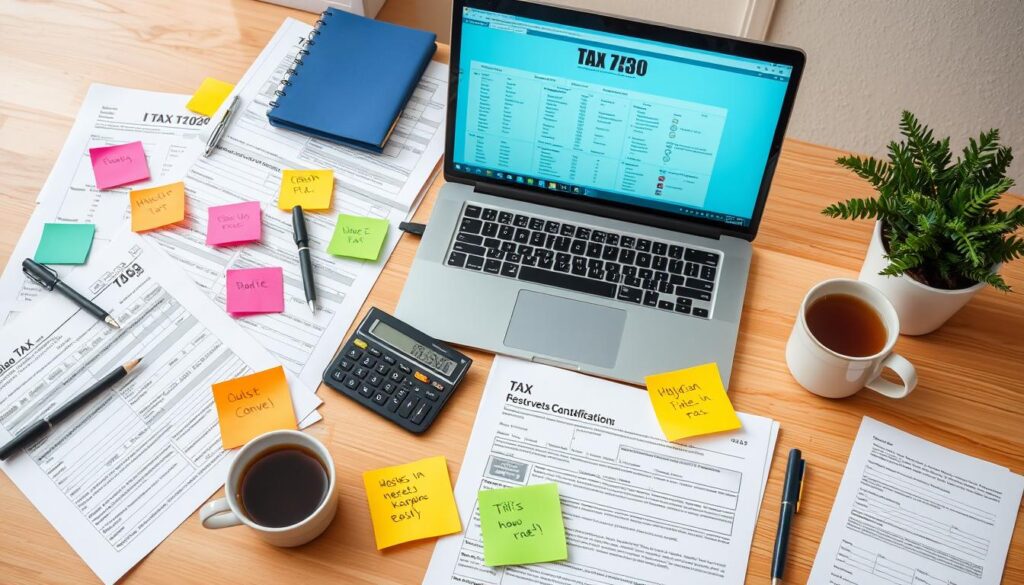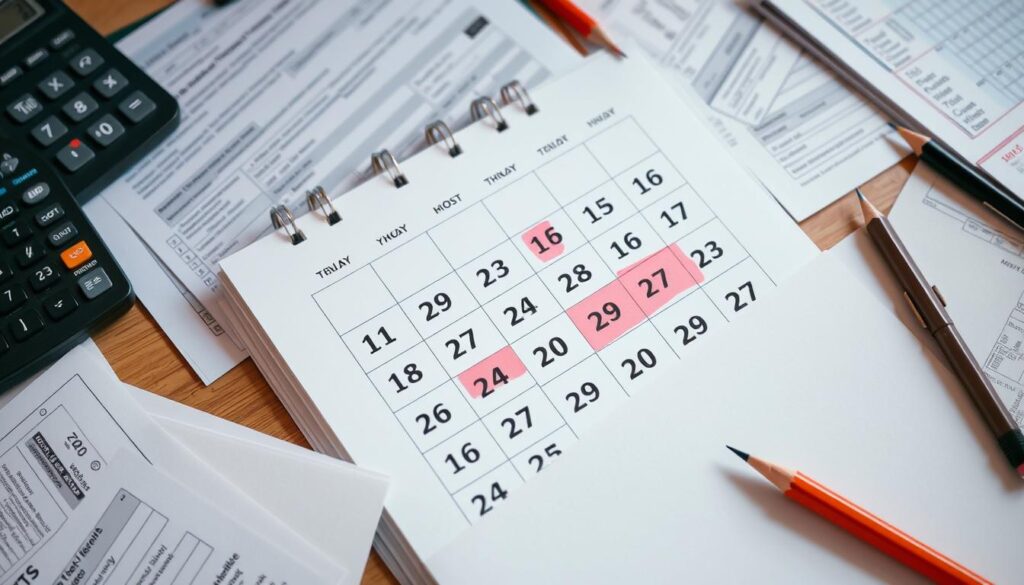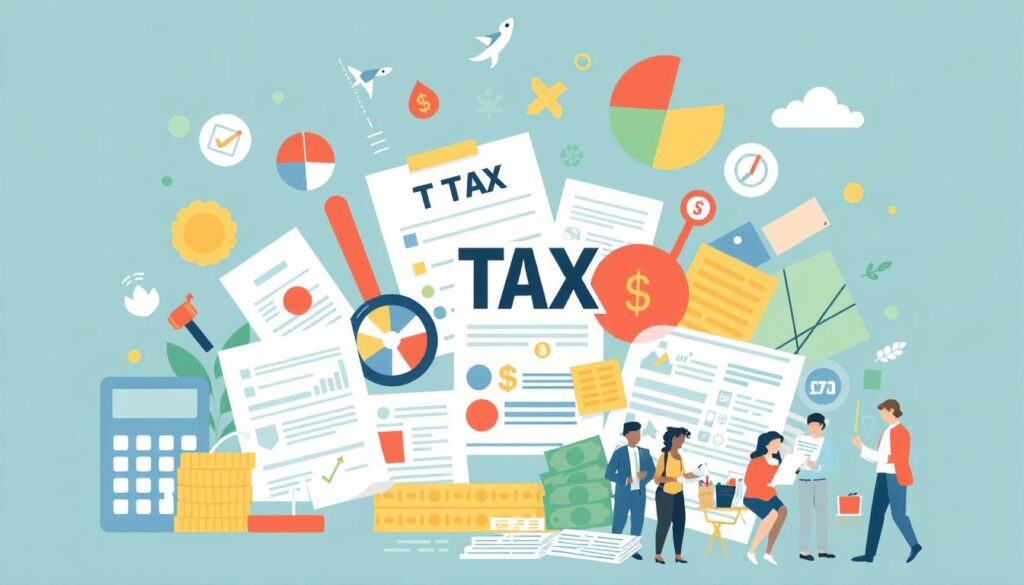Did you know about 77% of Americans file their taxes every year? This huge number shows how vital it is to know your tax duties. Most people working in the USA need to pay taxes if they earn over a certain amount1. The rules for taxes can seem complex, but don’t worry. This guide will simplify things for you. We’ll cover everything from federal tax basics to keeping good records and filing on time. Our goal is to give you the knowledge to handle your taxes with confidence.
If you’re working for yourself, in the gig economy, or own a business, understanding taxes is key. Reporting what you make, knowing how to file, and meeting deadlines can save you from stress and extra costs. Let’s dive into the basics of tax duties. We’ll provide useful tips to make dealing with taxes easier for you.
Key Takeaways
- Understanding the basic USA tax requirements is essential for compliance.
- Timely filing and accurate record-keeping can help minimize tax-related worries.
- Most workers are required to report income exceeding a specific threshold.
- Knowledge of tax filing options can lead to faster tax refunds.
- Staying informed about tax law updates is vital for making sound financial decisions.
Understanding the Basics of USA Tax Information
Understanding simple tax facts is essential for good tax planning. In the USA, most government funds come from income taxes. These taxes help pay for vital services like Social Security and Medicare2. The federal income tax system is progressive. This means people with different incomes pay different rates, starting at 10% for those who earn the least2. Learning these core details helps you file your taxes right.
It’s key to know how taxes work at all levels — federal, state, and local. Local governments use taxes for important services, like police and fire departments2. This shows why paying taxes matters for everyone. When you do your taxes, using guides can clear up questions about exemptions and dependents. For instance, F-1 and J-1 visa students have to file a tax form even if they made no money. That’s because they’re often seen as nonresidents for tax reasons3.
Your tax situation can change a lot based on where you live. For example, the Substantial Presence Test figures out if you’re a tax resident. This decides how you report your income3. Staying up-to-date on these rules can make tax time easier. It might even lower how much tax you owe.
The Importance of Maintaining Proper Tax Records
Every taxpayer needs to keep proper tax records. These documents are key when you do your tax returns. You’ll need to hold onto a variety of documents like W-2s, 1099s, and receipts. They prove your financial moves. The IRS has rules on how long you should keep these records. This depends on your specific situation.

Usually, the IRS can ask about your taxes for three years after you file. If you didn’t report more than 25% of your income or if you have over $5,000 in foreign assets4, they can ask for six years. If you filed a false return or didn’t file one, there’s no time limit for them to check4.
If you want to get a refund, keep your records for at least three years or two years after paying. Have bad debts or worthless stocks? You need those records for seven years4. Keep records of property until you can no longer amend that year’s tax return. Don’t forget to save documents for health insurance claims, too4.
Business owners should keep track of income and expenses for four years after their tax due or paid4. Tools like the Penn State Extension’s Farm Account book help a lot. So do programs like Quicken® or QuickBooks®5. Reviewing your accounts at the end of the year can help make next year’s taxes smoother. It lowers the chance of mistakes.
If you’re a farmer, really look into your finances before doing your taxes5. Check how much you spent, make cash plans, and understand your business better. This planning is part of why keeping good records is crucial for success.
Steps to File Your Taxes
To file your taxes, start by collecting all needed financial papers, like W-2s and 1099s. You need these to fill out your IRS Form 1040 right. It’s crucial to make sure your income is correctly reported. This is the core of how your taxes are figured out.
Then, see if you can get tax breaks or deductions. For instance, if you make less than $13,850 alone or $27,700 married filing together, you might get bigger refunds. The Earned Income Tax Credit (EITC) also helps, especially if you have kids, by giving extra money based on how many children you have6.
Decide on how to file your taxes. E-filing is quicker, usually getting you your refund in about 21 days. Paper filing is slower, taking 4 to 6 weeks for refunds to arrive7. If making under $79,000, consider the IRS Free File program for e-filing8.
Before turning in your return, double-check everything to avoid mistakes. Most people need to file by April 15, 20247. If you need more time, you can ask for a six-month extension until October 15, 20246.

Your Filing Options: E-File vs. Paper Filing
When you file your taxes, you can pick between e-filing and paper filing. Each has its pros and cons, so think about what suits you best.
IRS online filing is more accurate. Paper returns have a 20% error rate, compared to 1% for e-files9. With fewer errors, processing is smoother, and you get quicker feedback. Plus, if there’s a mistake in your e-file, the IRS can notify you within 48 hours9.
E-filing also speeds up tax preparation. You can get refunds from e-filed returns in under 21 days, especially with direct deposit9. Getting refunds faster, sometimes two weeks sooner than paper filers, is a big perk for many10.
However, paper filing could mean waiting longer. Errors can further delay your refund because of the longer processing time10.
When looking at costs, think about your tax return options. E-filing can be free, but tax preparers or software might charge up to $259. With the Free File software, costs could be zero, depending on your income10.
Your preference matters too. E-filing means no paper and you can sign electronically with a PIN9. This makes the process easier and more convenient.
Think about these points when choosing how to file your taxes. Picking the right method can save you time and money.

USA Tax Information: Key Deadlines You Should Know
Knowing key tax deadlines is important for everyone. The main date to remember is April 15. This is when your taxes for last year are usually due11. If you work for yourself, you’ll likely pay taxes four times a year11. Also, companies like partnerships and S-Corporations have to file by March 15. That’s if they follow the calendar year11.
Sometimes, the IRS gives more time to file if bad weather hits your area11. For 2024, individuals should remember these dates: January 15 for 4th Quarter estimated taxes, January 29 for the tax season start, and January 31 for sending out W-2s and some 1099s11. For C Corporations, April 15 is also key. They must file by then to avoid late fees12.
If you miss filing by the deadline, you might have to pay extra12. There are different ways to handle missed deadlines, depending on your situation11. For instance, getting an extension means you have until October 15, 2025, to file your 2024 taxes12.

Common Tax Credits and Deductions to Maximize Your Return
Understanding tax credits and deductions can really help your tax refund and finances. Options like the Child Tax Credit, education credits, and the Earned Income Tax Credit can cut down your taxes. Here are important details on these credits and deductions for you.
The Child Tax Credit and Its Importance
For the 2024 tax year, the Child Tax Credit offers up to $2,000 for each child. Families might get a refundable amount of up to $1,70013. This credit helps families with kids under 17 by lowering how much tax they owe14.
Education Credits: What You Need to Know
Education credits help with school costs. The American Opportunity Tax Credit offers up to $2,500 for education expenses, refundable up to $1,00013. You can also claim up to $2,500 for interest paid on student loans14. These benefits can help ease the cost of education.
Understanding the Earned Income Tax Credit
The Earned Income Tax Credit (EITC) is for those with low to moderate incomes. In 2024, the EITC can be from $632 to $7,830, depending on children and income13. It boosts refunds for hardworking people with lower earnings14.

Who Qualifies as a Dependent on Your Tax Return?
Understanding who qualifies as a dependent on your tax return is key. A child must be under 19, or under 24 and a full-time student15, to qualify. They also need to rely on the taxpayer for more than half of their support15. The rules about age, where they live, and who supports them are important. They influence dependent exemptions and the tax benefits you might get.
When it comes to qualifying relatives, their yearly income must not go over $4,70015. It’s also important that no one else claims them as a dependent on their tax return15. All dependents must be U.S. citizens, resident aliens, or nationals. Or, they can live in Canada or Mexico15. They must fit into the categories of a qualifying child or relative for you to get tax credits or deductions.
For children, living with you for more than half the year is essential15. Claiming a dependent allows you to get tax benefits like the Child Tax Credit and Earned Income Tax Credit16. It’s also key to remember that dependents can’t file a joint return. The only exception is if they’re filing to get a refund15.
To simplify your understanding of dependent qualifications, consider the following comparison:
| Criteria | Qualifying Child | Qualifying Relative |
|---|---|---|
| Age Requirement | Under 19 or under 24 if a full-time student | No age restriction |
| Support Requirement | More than half of support from taxpayer | Gross income below $4,700 |
| Residency Requirement | Must live with taxpayer for more than half the year | Must meet household living arrangements criteria |
| Filing Status | Cannot file a joint return, except to claim a refund | No specific restrictions |

How to Avoid Missing Out on Refunds
To get the most out of your tax refunds, you must pay close attention and know your options. Making sure your filing is accurate is crucial. Tax software helps avoid math mistakes and checks for missing info, helping you dodge common slips17. Certified public accountants or enrolled agents can greatly lower the chance of mistakes in your returns17.
Free tax return help is available through IRS-certified volunteers for many taxpayers18. If you make $79,000 or less, IRS Free File makes it easy to claim refunds18. This service helps you get your refunds without missing any, tailored to your financial situation.
Filing online is a smart move to ensure you don’t miss out on refunds. The IRS suggests e-filing for quicker processing, with direct deposit being the fastest way to get your tax refunds17. Always double-check your bank details to prevent delays17.

When you e-file, checking your return’s status in 24 hours is possible19. It’s interesting to note that the IRS sends most refunds in under 21 days19. Filing early and using the right resources maximizes your chance of a quick refund.
Conclusion
Doing taxes might feel hard, but knowing the basics of USA tax info makes it easier. We’ve talked about the need to keep good records, important deadlines, and key credits and deductions. These help a lot in getting the most out of your return. Understanding these things helps you file correctly and avoid mistakes.
The IRS offers a lot of help, including nearly 2,000 revenue rulings every year20. With the right paperwork and a clear understanding of tax rules, you can be ready for tax season. This also lets you use all the benefits you’re due. This way, you pay less in taxes and get a bigger refund.
Tax rules change often, so it’s important to keep up with these changes. This keeps you smart about taxes and helps you make the best choices for your money21. Staying organized and informed is key to doing well with taxes. It also helps you build a better financial future for yourself.
FAQ
What are the basic USA tax requirements I need to know?
Why is it important to maintain accurate tax records?
What steps should I follow to file my taxes using IRS Form 1040?
What are the advantages of e-filing compared to paper filing?
What key tax deadlines should I be aware of?
Can you explain some common tax credits that can lower my tax liability?
Who qualifies as a dependent on my tax return?
How can I make sure I don’t miss out on potential refunds?
Source Links
- Information About Federal Taxes [English] – https://www.irs.gov/help/information-about-federal-taxes
- Taxes: Understanding the basics – https://files.consumerfinance.gov/f/documents/cfpb_building_block_activities_taxes-understanding-basics_handout.pdf
- Income Tax Basics – Global Engagement – https://global.tamu.edu/isss/resources/taxes/basics
- Topic no. 305, Recordkeeping | Internal Revenue Service – https://www.irs.gov/taxtopics/tc305
- The Importance of Understanding Your Tax Information – https://extension.psu.edu/the-importance-of-understanding-your-tax-information
- Guide to filing your taxes in 2024 | Consumer Financial Protection Bureau – https://www.consumerfinance.gov/consumer-tools/guide-to-filing-your-taxes/
- File your return | Internal Revenue Service – https://www.irs.gov/filing/individuals/how-to-file
- How to File Taxes: A Complete Guide – https://www.businessinsider.com/personal-finance/taxes/how-to-file-taxes
- E-file: Income Tax Return Electronic Filing – https://turbotax.intuit.com/tax-tips/e-file/e-file-income-tax-return-electronic-filing/L9DnoQ39y
- Get ready to file your income tax return – https://www.tax.ny.gov/pit/efile/filing-checklist.htm
- Every Tax Deadline You Need To Know – https://turbotax.intuit.com/tax-tips/tax-planning-and-checklists/important-tax-deadlines-dates/L7Rn92V1d
- Tax due dates & deadlines for 2025 – https://www.sage.com/en-us/blog/tax-due-date/
- 22 Popular Tax Deductions and Tax Breaks – NerdWallet – https://www.nerdwallet.com/article/taxes/tax-deductions-tax-breaks
- Tax Deductions & Tax Credits to Know for 2024 | Equifax – https://www.equifax.com/personal/education/personal-finance/articles/-/learn/popular-tax-credits-and-deductions-2024/
- Dependents | Internal Revenue Service – https://www.irs.gov/credits-deductions/individuals/dependents
- Publication 4491 (Rev. 10-2021) – https://apps.irs.gov/app/vita/content/globalmedia/4491_dependency_exemptions.pdf
- Common tax return mistakes that can cost taxpayers – https://www.irs.gov/newsroom/common-tax-return-mistakes-that-can-cost-taxpayers
- Things to remember when filing 2023 tax returns – https://www.irs.gov/newsroom/things-to-remember-when-filing-2023-tax-returns
- Direct Deposit (Electronic Funds Transfer) – https://www.fiscal.treasury.gov/eft/faq-tax-refund.html
- Understanding IRS Guidance – A Brief Primer – https://www.irs.gov/newsroom/understanding-irs-guidance-a-brief-primer
- IRS Provides Facts, No Conclusion, on Filing Requirement Advice – https://www.taxnotes.com/lr/resolve/tax-notes-today-global/irs-provides-facts-no-conclusion-on-filing-requirement-advice/7dyvl









